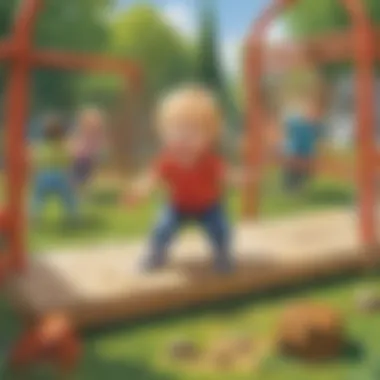Engage Your 4-Year-Old with Stimulating Games for Creative Development


Fun Activities for 4-Year-Olds
Introducing children to engaging games at a tender age sets the foundation for their growth and development. By incorporating interactive and stimulating activities, you can nurture their creativity and cognitive abilities from the outset. Let's delve into a range of fun ideas to captivate the imagination of your 4-year-olds.
Indoor Activities
When the weather confines playtime within four walls, indoor activities come to the rescue. From imaginative role-playing to sensory play stations, there's a myriad of options to keep your little ones entertained. Consider setting up a mini obstacle course using cushions or engaging in a treasure hunt to foster problem-solving skills.
Outdoor Adventures
Venturing outdoors offers a vast playground for exploration and discovery. Whether it's a nature scavenger hunt in the backyard or a picnic at the park, outdoor adventures stimulate a child's senses and enhance their physical abilities. Embrace nature walks, visit local playgrounds, or engage in simple gardening activities to ignite a sense of wonder in your 4-year-old.
Arts and Crafts
Unleash the budding artist in your child through arts and crafts activities. From finger painting to constructing DIY masterpieces, creative expression knows no bounds. Encourage your little one to experiment with colors, textures, and shapes, fostering a love for all things artistic and innovative. Remember, mess can be part of the creative process!
Science Experiments
Introducing basic science experiments at an early age instills a curiosity for the world around us. Simple activities like baking soda volcanoes or rainbow color mixing demonstrate scientific concepts in a playful manner. Engage in hands-on experiments to spark an interest in STEM fields and nurture a spirit of inquiry in your child.
Cooking and Baking
Involving kids in cooking and baking activities not only enhances their practical life skills but also encourages healthy eating habits. From shaping cookies to mixing ingredients, culinary experiences can be both educational and enjoyable. Engage your 4-year-old in simple tasks like mixing, pouring, and tasting to instill a sense of accomplishment and camaraderie in the kitchen.
Educational Games
Transitioning from playful activities to educational games offers a balanced approach to your child's growth and learning. Explore a diverse range of games tailored to enhance their math, language, and STEM skills, laying a strong foundation for academic success.
Continue with other sections and subtopics following a detailed and engaging narrative structure.
Introduction to Interactive Games for 4-Year-Olds


In the realm of childhood development, the realm of play stands as an indispensable facet. Interactive games hold a pivotal role in the growth and learning of 4-year-olds, offering a gateway to a world where imagination, social skills, and cognitive abilities converge in seamless harmony. This section delves into the intricate tapestry of interactive play tailored especially for the tender minds of 4-year-olds, showcasing how these games become not just a source of entertainment but a catalyst for holistic development.
Benefits of Interactive Play
Enhanced Cognitive Skills
Embarking on the journey of enhanced cognitive skills through interactive play elevates a child's ability to analyze, strategize, and problem-solve. This pivotal aspect of cognitive enhancement paves the way for sharper mental acuity, improved memory retention, and enhanced decision-making skills. By engaging in thought-provoking games, children hone their cognitive faculties, laying a robust foundation for future academic pursuits and intellectual endeavors. The distinct advantage of enhanced cognitive skills lies in its ability to stimulate critical thinking and creative problem-solving, fostering a resilient mindset adept at tackling challenges in a fast-paced world.
Improved Social Interaction
The realm of improved social interaction within interactive games encapsulates the essence of collaboration, communication, and empathy. By immersing in games that require social engagement, 4-year-olds learn the art of teamwork, emotional regulation, and conflict resolution. These skills are not only invaluable in navigating interpersonal relationships but also serve as a cornerstone for building a strong sense of empathy and understanding towards others. The unique feature of improved social interaction lies in its capacity to cultivate a sense of camaraderie and mutual respect among young players, nurturing social skills that are essential for a harmonious coexistence in society.
Development of Fine Motor Skills
Delving into the development of fine motor skills through interactive play unveils a world where hand-eye coordination, dexterity, and precision intertwine to fortify a child's physical abilities. Fine motor skills lay the groundwork for tasks such as writing, buttoning clothes, and using utensils effectively. By engaging in games that demand intricate hand movements and coordination, 4-year-olds refine their motor skills, paving the way for mastery in various physical activities. The advantage of fine motor skill development lies in its ability to enhance a child's sense of control, spatial awareness, and refinement in executing precise movements with finesse.
Setting the Stage for Fun Learning
Creating a Playful Environment
At the core of creating a playful environment lies the essence of fostering a space where creativity, exploration, and spontaneity reign supreme. By immersing 4-year-olds in a setting brimming with colorful stimuli, intriguing objects, and versatile play zones, caregivers sow the seeds for imagination to flourish. A playful environment not only sparks joy and excitement but also serves as a fertile ground for cognitive stimulation, emotional expression, and sensory exploration. The allure of creating a playful environment lies in its capacity to ignite a child's curiosity, instill a sense of wonder, and provide a safe haven for uninhibited exploration and self-expression.
Incorporating Learning Elements
Venturing into the terrain of incorporating learning elements within interactive games ushers in a realm where education seamlessly intertwines with entertainment. By infusing games with alphabet recognition, number sense, and thematic learning, caregivers create a dynamic space where knowledge is acquired through play. Incorporating learning elements not only boosts children's academic readiness but also fosters a positive attitude towards learning, instilling a lifelong love for knowledge acquisition. The advantage of incorporating learning elements lies in its ability to transform mundane educational concepts into engaging adventures, making the learning journey both fruitful and enjoyable for young learners.
Indoor Games for 4-Year-Olds
The topic of Indoor Games for 4-Year-Olds within this article holds significant importance, offering a range of developmental benefits and entertainment opportunities for young children. Indoor activities play a crucial role in enhancing cognitive skills, fostering creativity, and providing a safe environment for play. By engaging in indoor games, children can explore their imaginations, hone their motor skills, and learn essential social interaction skills. These games also offer a great way for parents and caregivers to bond with their children while providing educational value and promoting a healthy lifestyle.
Obstacle Course Adventures


1th Linked Advertisement
Sensory Bin Exploration
2aled Latest Article educt, thSeparated sectionSome ned stepstateur molend combat
Shape and Color Sorting
3rd Both atalimportantom bothreqkeyupmaster> contriorts Simplhlepeshit consid ];eie;
Outdoor Games for 4-Year-Olds
Outdoor games play a pivotal role in the holistic development of four-year-olds. Encouraging children to engage in outdoor activities not only nurtures their physical well-being but also enhances their cognitive abilities and social skills. The open environment of outdoor spaces offers unique opportunities for exploration, creativity, and learning. Parents, guardians, and educators can leverage outdoor games to provide a stimulating and enriching experience for young minds.
Nature Scavenger Hunt
Nature scavenger hunts are a fantastic way to introduce children to the wonders of the natural world. By embarking on this adventure, kids develop their observation skills, learn about different plants and animals, and foster an appreciation for the environment. Encourage children to use their senses - sight, smell, touch, and hearing - to explore the outdoor surroundings. Provide them with a list of items to find, such as leaves, rocks, or flowers, promoting curiosity and inquisitiveness. Remember to ensure the safety of the play area and supervise the scavenger hunt to make it a fun and educational experience.
Sidewalk Chalk Masterpieces
Creating sidewalk chalk masterpieces enables children to unleash their creativity and artistic talents in an outdoor setting. This activity not only fosters imaginative thinking but also enhances fine motor skills and hand-eye coordination. Supply your little artists with colorful chalks and let them transform the pavement into a canvas of vibrant designs and patterns. Encourage them to express themselves freely, experiment with different shapes and colors, and take pride in their creations. Celebrate their artistic endeavors by showcasing and admiring their masterpieces together.
Water Play Fun
Water play is a delightful outdoor activity that offers endless entertainment and learning opportunities for four-year-olds. Whether splashing in a kiddie pool, running through sprinklers, or playing with water toys, kids engage in sensory experiences that stimulate their senses and motor skills. Water play also presents a chance for children to understand basic scientific concepts such as buoyancy, flow, and volume in a hands-on manner. Supervise the water play session, ensure safety measures are in place, and watch as your little ones immerse themselves in a world of aqua adventures and exploration.
Educational Games for 4-Year-Olds
Educational games play a crucial role in the development of young minds. In the context of this article on engaging games for 4-year-olds, educational games are highlighted for their dual purpose of providing fun while facilitating learning. These games are meticulously designed to enhance cognitive abilities, introduce basic concepts, and foster a love for learning at an early age. Parents, caretakers, and educators should consider integrating educational games into a child's playtime routine to promote holistic development.
Alphabet Bingo


Alphabet Bingo is a captivating educational game aimed at teaching 4-year-olds the alphabet in an enjoyable and interactive manner. Children are given bingo cards with letters instead of numbers. The game involves calling out a letter, and the child then marks the corresponding letter on their card, helping them recognize and familiarize themselves with the alphabet. Alphabet Bingo not only aids in letter recognition but also improves memory retention and visual skills. Adding a competitive element by offering small rewards for completing a row or a full card can further enhance engagement and motivation.
Counting with Fun Objects
Counting with Fun Objects is a hands-on educational game that makes learning numbers exciting for 4-year-olds. By using everyday items like toys, fruits, or pebbles, children can grasp numerical concepts through tangible play. This game not only reinforces counting skills but also enhances fine motor skills and hand-eye coordination. Encouraging children to count aloud while manipulating objects reinforces their understanding of quantity and enhances numerical fluency. Counting with Fun Objects transforms abstract mathematical concepts into concrete, relatable experiences for young learners.
Shape Matching Challenge
The Shape Matching Challenge is an educational game designed to develop 4-year-olds' visual perception and problem-solving skills. Children are presented with a set of cards or blocks with different shapes, colors, or patterns that they must match accordingly. This game not only sharpens cognitive abilities but also hones critical thinking and decision-making skills. By engaging in the Shape Matching Challenge, children enhance their spatial awareness, pattern recognition, and concentration levels. The interactive nature of the game makes learning about shapes engaging and memorable, laying a strong foundation for future academic success.
Creativity-Boosting Games for 4-Year-Olds
In this section, we delve into the essential aspect of enhancing creativity in 4-year-olds through engaging games. Creativity-Boosting Games play a pivotal role in developing a child's cognitive abilities and imagination. By encouraging young ones to think outside the box and explore their artistic side, these games lay a foundation for innovative thinking and self-expression. One of the primary benefits of such games is the nurturing of problem-solving skills and ingenuity. Parents, teachers, and guardians can witness firsthand how these activities spark a child's creativity and artistic flair. Therefore, incorporating Creativity-Boosting Games in a child's routine can significantly contribute to their overall growth and development.
1. Playdough Sculpting
The Playdough Sculpting activity is a fantastic way to enhance a child's fine motor skills while fostering creativity. By allowing 4-year-olds to mold and sculpt using playdough, they improve their hand-eye coordination and dexterity. This hands-on activity also encourages sensory exploration as children manipulate the soft texture of the playdough, stimulating their tactile senses. Moreover, Playdough Sculpting provides a platform for imaginative expression, where young ones can create various shapes, objects, and even characters from their vivid imagination. Through this activity, children not only engage in artistic play but also learn the basics of shaping and forming, laying a creative groundwork for future endeavors.
2. Storytelling with Puppets
Storytelling with Puppets offers a dynamic way to ignite a child's imagination and language skills. This interactive activity allows 4-year-olds to step into the world of storytelling, where they can create narratives, characters, and dialogues using puppets as their storytelling companions. By engaging in role-play and crafting their stories, children develop crucial narrative skills and enhance their vocabulary. Furthermore, Storytelling with Puppets fosters creativity as young ones fabricate imaginative tales and explore different storylines. Through this activity, children not only enhance their communication abilities but also gain a deeper appreciation for storytelling and creative expression.
3. Recycled Art Creations
Engaging in Recycled Art Creations introduces 4-year-olds to the concept of sustainability and innovation through art. By utilizing everyday materials such as cardboard, paper, and plastic bottles, children can unleash their creativity and transform ordinary items into artistic masterpieces. This activity not only encourages environmental awareness but also empowers children to experiment, problem-solve, and repurpose materials creatively. Recycled Art Creations provide a hands-on learning experience where young ones explore colors, textures, and composition while understanding the importance of repurposing and recycling. Through this activity, children not only engage in sustainable practices but also boost their artistic skills and develop a sense of creativity with a purpose.
Conclusion
In wrapping up this comprehensive guide on engaging games for 4-year-olds, it is crucial to underline the significance of providing young children with activities that not only entertain but also promote their cognitive, physical, and emotional development. The Conclusion section serves as a vital component of this article as it summarizes the key takeaways and highlights the overarching themes discussed throughout. By emphasizing the value of play in early childhood education, parents, teachers, and guardians can better understand how engaging games contribute to a child's holistic growth and wellbeing.
Encouraging Playful Learning
Encouraging playful learning in 4-year-olds lays the foundation for a lifelong love of exploration and discovery. By integrating educational concepts seamlessly into play, children can absorb information effectively and develop crucial skills in a fun and engaging manner. This approach not only enhances their cognitive abilities but also fosters a positive attitude towards learning, setting them up for future academic success. Through interactive games that stimulate creativity and critical thinking, children can unlock their full potential and cultivate a thirst for knowledge that will benefit them in various aspects of life.
Building Strong Bonds Through Play
Building strong bonds through play is a cornerstone of nurturing healthy relationships between children and their parents, caregivers, or peers. When adults participate in games with 4-year-olds, they not only create lasting memories but also establish trust, mutual respect, and emotional connections. Playful interactions contribute to a child's social and emotional development, teaching them important values such as teamwork, empathy, and communication. By engaging in games together, adults can strengthen their bond with young children and create a supportive environment where growth, laughter, and learning go hand in hand.



